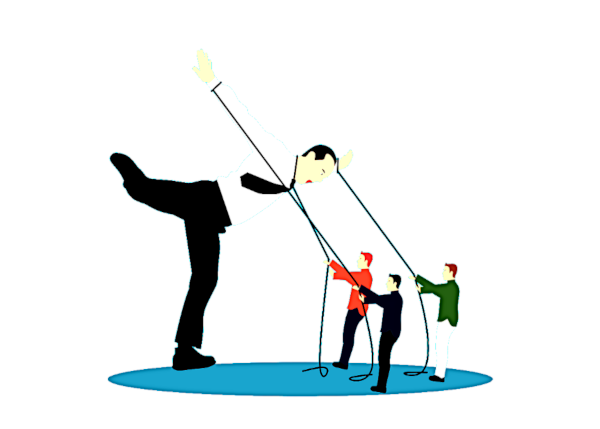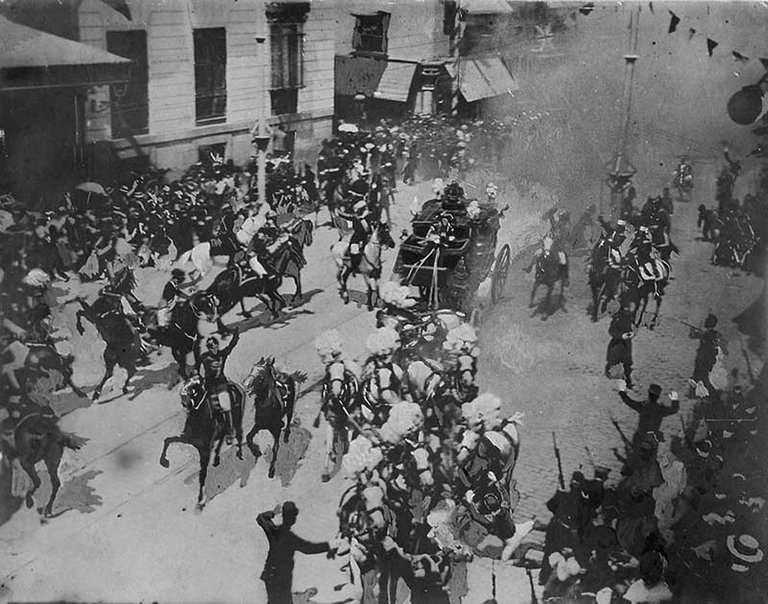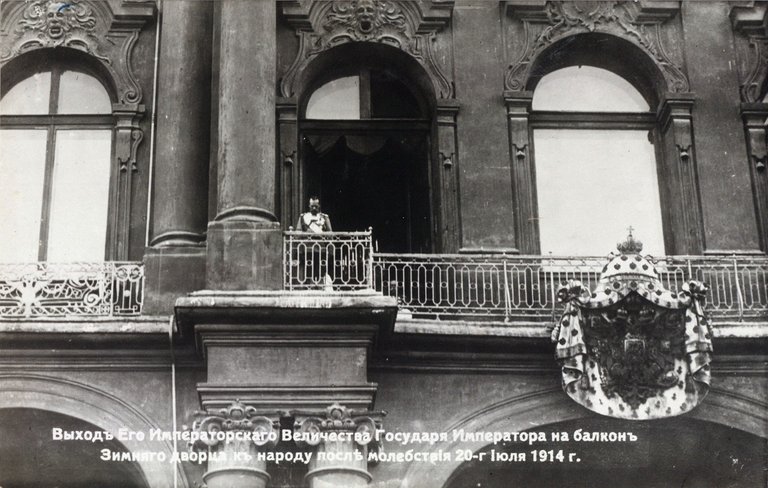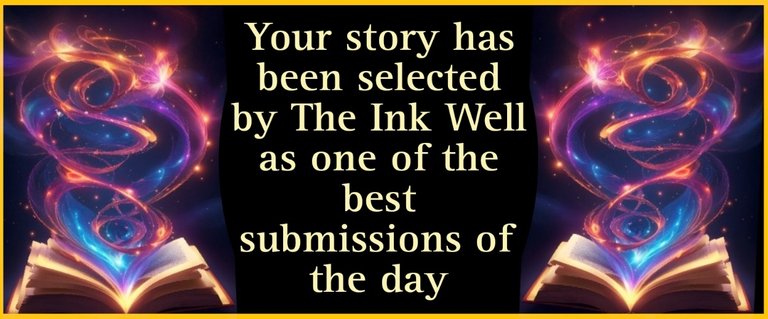Do leaders, even absolute rulers, care what their people think? History seems to show that the smart ones do. Powerful governments have been toppled by a discontented populace.

There is a story (possibly apocryphal) about Alfonso XIII, King of Spain (1896-1941). Alfonso had sent his troops to fight an unpopular war in Africa. The king, and those around him, harbored the ambition of rebuilding the Spanish empire, which had been diminished in the Spanish American War. Africa was in the king's sights. Spanish forces were fighting against the local population in the Rif Mountains, Morocco.
After a particularly brutal battle, in which 13,000 Spanish soldiers and Alfonso's hand picked general perished, the king was told of the defeat. The messenger interrupted his tennis game. The king paused and said, "Chicken meat is cheap". Then he resumed playing his game.
Attempted Assassination of Alfonso XIII and his Wife on Their Wedding Procession(1906)

Eugenio de Mesonero Romanos Public. A bomb was thrown. 28 people died. 100 were wounded. The King and Queen were unharmed.
The Spanish population had been restive for years, and the war did not sit well with many. The king's approach to managing the unrest was to endorse the authority of a notoriously oppressive Primo de Rivera. The strong arm approach toward managing discontent did not end well for Rivera or the king. Both were forced to flee from Spain in 1931.
Alfonso and Rivera did not understand one principle of government, even tightly controlled, autocratic government: it's dangerous when the people turn against you.
In 1905 the czarist government in St. Petersburg, Russia fired upon a large crowd that had formed to present a petition to the Czar. The crowd carried icons, and even pictures of the Czar with them. They came in peace. They were entreating their leader to listen to their grievances. While it wasn't the Czar himself who ordered the massacre (he wasn't even there), this massacre became a unifying event for those who were unhappy with the Czar's rule. What became known as Bloody Sunday was a catalyst for protests across the country.
The people of Russia wanted reform. Instead, what they got was WWI and more hardship.
Nicholas II Declaring War on Germany, 1914

Author unknown. Public As an aside, it seems the Czar's response to the distress of his people was complicated by the fact that he did not receive accurate information about how bad things were getting by 1916. It seems officials in the villages were afraid to send bad news up the line.
Peasants were hit hard by demands of the war. In 1917, three years after the war started, 47% of eligible males, those between the ages of 18 and 60, were conscripted. Stories from the front were not good. Soldiers were so poorly outfitted that there weren't enough rifles for everyone. It is said that soldiers without rifles were told to march behind those who had them. When the armed soldier fell, the man behind him was instructed to pick up the gun and continue fighting.
By 1917 shortages and life lost led to such widespread discontent that the country was ripe for Revolution. In July of 1918, the Czar and his family were shot, on orders of a revolutionary council. The bodies of the royal family were interred in a secret grave.
In both Spain and Russia, governments were toppled because of popular discontent. The people who at one time may have been loyal and felt a bond to their leaders, became alienated. It was the alienation, and not necessarily the hardship, that led to revolt.
A leader may rule by force, but even the most authoritarian government needs to recognize the danger of alienating the people they rule.
The Scottish psychologist Stephen Reicher, who studies group psychology and collective behavior, addresses what has traditionally been described as 'mob mentality'. Historically, social scientists have explained that a 'mob' behaves as it does because the people in it feel anonymous. Their anonymity, social scientists argue, gives them license to behave badly, because they do not expect to be held to account. Reicher thinks this analysis of 'mob' behavior is wrong. From his research he has concluded that members of a crowd don't feel anonymous, but gain strength from a sense of shared purpose with those around them. People in a crowd, such as a protest, act not just for themselves, but for a cause and for members of their group.
Abernathy Children on Front Line Leading the Selma to Montgomery March for the Right to Vote
Abernathy Family. Public domain
This group dynamic is powerful. It behooves the leader of a country to understand it, and to use it. A wily leader will act in a way that makes the people feel common cause with her/him. This was obviously not the case with Alonso XIII (of Spain), or with Nicholas II (of Russia).
How does a leader tie the people to him/her?
Two thousand years ago Roman emperors ruled absolutely, yet they made concessions to the crowd. 'Bread and Circus' came down through the ages as the means by which emperors in Rome courted favor from their people. No matter what else was going in the empire, emperors made sure that the people were fed and that they were pacified by public displays. Huge venues were constructed, such as Circus Maximus and the Colosseum. Here, crowds as large as 150,000 (in the Circus Maximus) were accommodated.
Besides courting the population through gratification, leaders may tie people to them by facing a common threat.
George Orwell, in his novel 1984, Oceania was in a state of perpetual war. The same dynamic works in 'real' life.
Before WWII, in the United States, there was disunity. The country was struggling to come out of the Great Depression and most people were adamant about 'Europe's' war: They didn't want any part of it. Then the Japanese bombed Pearl Harbor. Overnight, the nation was united. Together people sacrificed and fought, as they had not been willing to do a few days before.
In the summer of 2001, the president of the United States, George W. Bush, had an approval rating that barely reached 50%. On September 11, 2001 the Twin Towers of the World Trade Center were destroyed in an act of terrorism. Within days, the president's approval rating shot up to 90%. By early 2003 it had sunk again to the mid 50s. In March of that year, the U. S. declared war on Iraq, and his approval rating shot up to 75%.
George W. Bush on the Day He Declared 'Mission Accomplished' in the Iraq War
![George_W._Bush_walks_with_Ryan_Phillips_to_Navy_One[1].jpg](https://images.hive.blog/768x0/https://files.peakd.com/file/peakd-hive/agmoore/23zGeFu2Y4NJs228wdLxkgNDy41XaEXWFKqfzxN7vm42dK2KtNcB54AWBCCjWcTcBrubx.jpg)
White House photographer Susan Sterner. Public domain
In both WWII and George W. Bush's presidency, the people of the United States came together with a common purpose, to defeat a common enemy. To do that, they needed to bond with their leader. Every clever leader understands this dynamic. Leaders can use the tools at their disposal to pacify populace. They can exploit and even precipitate circumstances that create the impression of a threat, of a common purpose.
What is the point of this blog?
I am not a leader. I am one of many, subject to the actions of a leader. As a humble member of my group (the people of the United States), I try to understand the dynamic that drives the actions of my leaders and my fellow citizens.
We have to make decisions, as citizens. It may seem that what we decide and do doesn't matter. Perhaps that's true for individuals, but in the aggregate it matters. It matters very much to our leaders, and so they mold us. They mold our opinions, the circumstances of our lives, the way we receive information about those circumstances.
Now I move on to the next point of my blog: Information. We act on what we know, but how do we come to know?
Books, newspapers, television, social media, word of mouth. Schools/education.
The more control a government asserts over books, libraries, schools, newspapers, social media, broadcast media, speech, schools--the more the government is trying to control the message. Government needs to tie the people to it. In order to do that, the government has to persuade the people that it has common purpose with them. Even if this defies logic, or what appears to be obvious, the government can mold the message so that people don't know what they think they know.
Columbia Banned Books Panel
![ColumbiaBannedBooksPanel[1].jpg](https://images.hive.blog/768x0/https://files.peakd.com/file/peakd-hive/agmoore/23zkjuPzJXX5Ai6jDfn4VdVJQyAWHfgFVXteS4zcESwrEzGSmNHPNGaix35qhvoPHzTgF.jpg)
Manny Warman Public domain
Thus, information is the final element in a leader's effort to hold us to him/her. Whoever controls the flow of information, controls the message. It is the message, what we 'know' and understand, that constitutes our reality, our sense of community and our sense of government.
The authors of the U.S. Constitution believed this. The amendment that was drafted before all others guaranteed freedom of speech and freedom of the press.
Our first obligation as citizens seems to be then, to keep information free of government control. Keep the government out of our libraries. Keep it out of our schools. Resist its control of print and broadcast media.
There is no such thing as speech from which the government must protect us. The only danger is in speech that is trammeled.
If we can discover what is truly happening in the world around us (or come close to the truth), then we can decide, independently, whether or not we have common cause with our government.
Accent image at the top of the blog: Mohamed_hassan on Pixabay
![Abernathy_Children_on_front_line_leading_the_SELMA_TO_MONTGOMERY_MARCH_for_the_RIGHT_TO_VOTE[1].JPG](https://images.hive.blog/768x0/https://files.peakd.com/file/peakd-hive/agmoore/23x14wgqdEJYpSQF7paVPZtnPqL1CroxJS4vR2jMCStQQsdSafe8PjdmhSdEes4WHzsnq.JPG)

